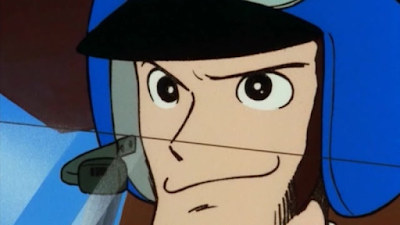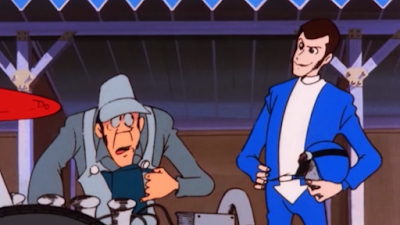Last year was the 50th anniversary of the anime adaptation of Lupin the Third. That means I spent even more time than usual talking it up over on Crunchyroll, Otaku USA, and wherever else I could get away with it.
It was a formative series for me. The Castle of Cagliostro was the first time I looked at an anime and went, "Damn, there's something really special here." And in recent months, I've found myself revisiting and researching it for a (long-overdue) (to-be-announced) short story.
So as I return to blogging after much longer than intended... I figured, what the hell. If I'm going back, you're going back.
The history of the animated series is fascinating to me, because it's evolved so much over time. And a lot of that evolution was by necessity, and a lot of that was tied weirdly directly to — of all things — post-War Japanese economy. And other things. But that was there.
Those changes began nearly as soon as the anime itself did. So that's what I'm here to look into, and drag you through with me. At least for Part 1. Maybe more. But let's not get ahead of ourselves.
Lighting up the Racetrack
"Is Lupin Burning?" was the beginning of the beginning — not counting the pilot film, of course. It aired on October 24, 1971, and adapted (very, very loosely) Chapter 53 of Monkey Punch's original manga. (You'll find it in U.S. editions as Chapter 55, "Grand Theft Auto.") When I say "very loosely," I mean... yeah. We'll save that 'til later.
Lupin loves to drive fast. So of course, when he's invited to take part in a Formula 1 race, he accepts. In fact, it's a trap: all of Hida Speedway has been designed to "accidentally" kill him at a variety of turns. The mastermind? Scorpion (referred to as "Mister X" in later episodes), who wants to not only rid himself of Lupin, but demoralize Lupin's allies.
Of course, Lupin is only sort of dumb. He knows it's a trap. So he and Jigen come up with a plan to swap out mid-race, with Jigen dressed identically and driving an identical Ferrari. Meanwhile, Lupin sneaks off to the nearby Miracle Hotel to rescue Fujiko from Mister X's tickling machine. (You heard me.) Oh, right, and Zenigata is also in the race. Because he's convinced Lupin will do something before the day is out.
In the end, Lupin wins, flings the booby-trapped trophy back at Mister X's lackeys in the crowd, and blows up the stadium. Mister X, watching at a safe distance, is convinced that Lupin is (literally) burning. He's not, of course. But he does get caught by Zenigata, who was tipped off to his plan by Fujiko in exchange for ripping up her arrest warrant. Lupin escapes, Zenigata is left lugging a wrecked car to jail, and Lupin pops up in Fujiko's car to reassure her that he thinks treachery makes her hot.
So, how much of this is from the manga? Basically the race itself, Lupin and Jigen swapping places, and Zenigata also being in the race and (nearly) serving as his alibi. The original story involved Lupin taking off mid-race to rob a bank. Here, though, all he did was cheat, and stop himself from getting murdered.
Thief of Speed
It's still early days yet — Lupin the Third won't really start to change whole-hog until its new showrunners come in mid-season. But there's already an echo of what one of those major changes will be: the idea of Lupin stealing hypothetical things as opposed to carrying off a genuine heist.
When Lupin is on the stand accepting his exploding trophy, Zenigata initially comments that "all he's stolen is time." Of course, he eventually gets the tip-off from Fujiko that, if nothing else, there was some top-tier cheating going on. Which is enough, I guess, if you're the World's Greatest Thief with a detective on your tail.
In retrospect, it's interesting to note the similarity to the end of 1979's The Castle of Cagliostro: a film where Hayao Miyazaki would go out of his way to depict a less materialistic, more relatable Lupin. One who uses disposable lighters, who's clearly got several years of experience behind him. In Cagliostro, Zenigata notes to Clarisse that Lupin has stolen her heart — a much bigger get than any physical treasure.
So I might as well introduce the recurring theme of the journey from manga to anime. Which is that the Japanese Economic Miracle hit Monkey Punch like a freight train. The idea of being able to Have Things was a huge deal for him, which colored the manga. A lot. By the time the anime went into production, though, being able to afford things (hell, even the idea that the economy was on an upswing) was old news. A possession-hungry Lupin didn't resonate.
We'll see how that affects the character much more later. But for now, it's interesting to see a dash of that.
Cops and Robbers
Speaking of Zenigata. He's got one hell of a driving monologue, as he describes his and Lupin's respective destinies. As a descendant of Heiji Zenigata, it is his fate to chase, and catch, the descendant of Arséne Lupin. If things were different... Well, we'll go into that later.
Putting my thoughts together for this article, I ended up learning more about Heiji Zenigata's origins. While the character is an Edo-era detective, he was created as recently as 1931. Author Kodou Nomura based him somewhat on Sherlock Holmes, publishing his adventures in a serialized format. And while the original Lupin had his own bespoke detective rival in Ganimard, we all know by now how much Holmes (or rather, "Herlock Sholmes") figures into Arséne Lupin's history.
They shared a few stories, much to Arthur Conan Doyle's chagrin. And in those collected volumes, Lupin had a great little speech that stuck with me:
“You see, monsieur, whatever we may do, we will never be on the same side. You are on one side of the fence; I am on the other. We can exchange greetings, shake hands, converse a moment, but the fence is always there. You will remain Herlock Sholmes, detective, and I, Arsène Lupin, gentleman-burglar. And Herlock Sholmes will ever obey, more or less spontaneously, with more or less propriety, his instinct as a detective, which is to pursue the burglar and run him down, if possible. And Arsène Lupin, in obedience to his burglarious instinct, will always be occupied in avoiding the reach of the detective, and making sport of the detective, if he can do it.”
Whether Zenigata's speech was meant to mirror Lupin's speech to Sholmes, or whether it's just happy happenstance, I'll probably never know. But I love to see this mentality seeded throughout the history of the series, starting from the very first episode.
Next up is "The Man They Called a Magician," a very strange little episode that led to (sorry) one of my least favorite specials many years later. I'll be hitting that one up next Wednesday.
---
Like what I do? Consider dropping me a tip on Ko-fi — or bookmark the page, since I'll begin offering fresh content over there in the coming weeks!












